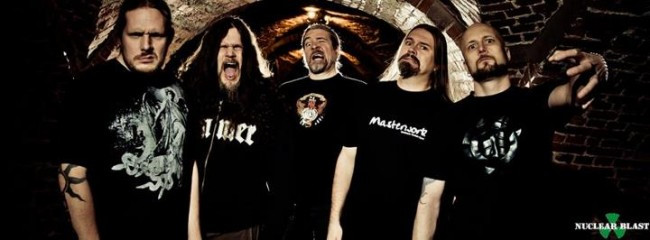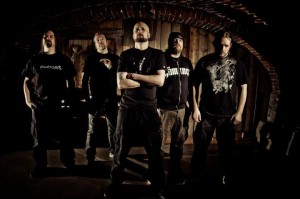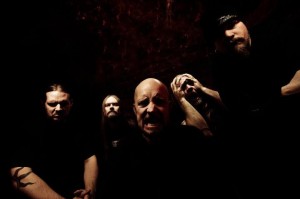
(In February, we published BadWolf’s early review of KOLOSS (here) — he got his greedy hands on it before his NCS comrades did. Now that the rest of us have had a chance to enjoy Meshuggah’s latest output, TheMadIsraeli weighs in with his own review.)
It’s time for me to put in my two cents on this beast. I realize BadWolf already did a stellar review of this album, but I really want to get my take out there as well. Meshuggah is one of my favorite bands of all time. I mean, not only in the top 10 favorites, but definitely in the top 3 on that list. Their sound is unmistakable, undeniable, and most of all, ever-moving.
But Meshuggah haven’t been moving forward in a straight line. Instead, they have often chosen to move sideways, contorting their signature sound since Nothing in whatever way they can while still maintaining its identity. Now Meshuggah are back with their much anticipated opus Koloss. Does it live up to the hype? Does it solidify Meshuggah’s legacy as renovators and innovators of the ways of brutality?
Yes, but not in the way that you might have expected.
In significant ways, you will hear a different Meshuggah on this album, a Meshuggah who have become comfortable with their position and esteem, choosing now to play with their sound in less limit-pushing ways and to pursue instead an interesting idea: Evolution through regression.

I’m sure many of you noticed this after hearing the first two singles from Koloss. Gone were the perplexing rhythmic head-spins, replaced with potent, straight-forward, no-bullshit groove that focused more on memorable riffs, overall providing a more organic, streamlined experience. Perhaps many of you were also thinking to yourselves that this would be the end of the road for Meshuggah, but I would contend that the band have instead breathed new life into themselves.
There are three essential things to know about this album. First, as just mentioned, the music is streamlined and simplified. Second, it is more devoted to channeling Meshuggah’s identity as a whole. This is not a continuation of Catch 33 or ObZen, but rather an attempt to blend together all of the band’s eras of musical exploration. There is the thrash of their early years, the industrial vibes of their mid-period, and the alien groove they’ve become especially known for.
The third essential is probably where I will lose some of you: There is a huge tribal metal vibe in Koloss. Yes, like Soulfly, Ektomorf, and their like.
The artwork even communicates this with its rather Aztec-ian mood and style. The drum work of Tomas Haake paints consistent mental images of tribal rituals, navigating the listener through humid, dark jungles and conjuring visions of human sacrifices done by firelight.
A lot of the songs just ooze this primal mood. The opener “I Am Colossus” is like the soundtrack to a primitive manhood initiation that requires you to kill 50 lions with your bare hands. It’s such a trudging, gloomy number, permeated with a grating harshness. The chorus riff in this song gets me every time. The drums around it change every time the chorus riff reappears, and even the placement of the notes is fooled with.
 “The Demon’s Name Is Surveillance” takes an odd twist by (a) being played on 6-string guitars, and (b) becoming the first Meshuggah song to feature a straight-up waltz feel. The song is very post-thrash, reminding me of Nevermore, and actually sounds like something you’d hear on Politics Of Ecstasy. Not that I’m complaining.
“The Demon’s Name Is Surveillance” takes an odd twist by (a) being played on 6-string guitars, and (b) becoming the first Meshuggah song to feature a straight-up waltz feel. The song is very post-thrash, reminding me of Nevermore, and actually sounds like something you’d hear on Politics Of Ecstasy. Not that I’m complaining.
“Don’t Look Down” is the funkiest number Meshuggah have written. Its main riff features smart, open-note-and-mute interplay that makes it infectious. The song as a whole is meant to do nothing but suck you in and get you moving. It doesn’t hurt that Fredrick Thordendal also busts out a solo that melts brains and scrambles intestines. He goes completely outside of his usual alien, repetitive tapping runs and opens up a can of ass-whooping jazz fusion.
“Behind The Sun” sees the Shug experimenting with doom metal, believe it or not. The result is something even more alien and ethereal than their usual fare. The song progressively loses its doom aura, though, as it delves into more and more double-bass saturated groove. It grows faster and faster, as if building to a climax, and then ends abruptly. The finish is just right.
After all this groove, though, “The Hurt That Finds You First” fucks everything up in its path in a downpour of napalm, acid rain, and nuclear fallout. There hasn’t been a Meshuggah song this fast and visceral in FOREVER! “War” was the last song we heard from these guys with this kind of intensity, and it’s quite refreshing to hear them playing something this fast with this much vigor. The outro of the song comes right back around to that tribal theme again, however, with an ambient drum outro and guitars with effects that make them sound like some kind of ethnic instrument.
“Marrow” is another one of the songs that defines the tribal feel I’ve been speaking about. Besides a tiny bit of syncopation here and there, the song as a whole kicks you in the face like a horse on PCP and immediately conjures the image of a pre-battle war dance. The bouncy rhythm and the extremely aggressive, cathartic drum assaults, which maintain a thumping, pulsing groove, really do bring me back to the more energetic material on Sepultura’s Roots (I feel a “Revisiting the Classics” post coming soon).
If “Marrow” weren’t enough evidence of my case, “Break Those Bones Whose Sinews Gave It Motion” and “Swarm” will certainly close it. Both numbers are groovy, foreboding, both painting the images you’d associate with tribal ritual. The drum refrains, the particular ambiences, the grooves, and even the way the drum progressions themselves are constructed, all feed that concept. “Swarm” also has a solo section that sounds more like a chorus of didgeridoos killing an elephant than a session of face-melting shred, for example.
 “Demiurge” is a colossal, hypnotizing groover that doesn’t really have a direction, so much as the effect of coaxing the listener into a brutal sledgehammer of a trance. It has such immense weight that I’m surprised my car doesn’t flatten itself into the pavement when I’m blasting the song through the windows. Combined with some nice eerie ambience, it serves as a powerful and potent precursor to the finale.
“Demiurge” is a colossal, hypnotizing groover that doesn’t really have a direction, so much as the effect of coaxing the listener into a brutal sledgehammer of a trance. It has such immense weight that I’m surprised my car doesn’t flatten itself into the pavement when I’m blasting the song through the windows. Combined with some nice eerie ambience, it serves as a powerful and potent precursor to the finale.
That’s where “The Last Vigil” comes in. It’s a soothing, reflective, clean piece with gripping melodic layers and textures. It has a powerful sonic sentiment of finality, and serves as a nice closing thought for a career-long reflection on the crafting of mathematical brutality and dimension-shattering chaos.
Koloss will not be everyone’s cup of tea. It’s a significant dialing back of the more technical aspects of Meshuggah’s sound in a quest for something much more organic and streamlined, something that sounds like the band is simply having fun with their twisted craft more than trying to change your perception of musical reality.
All of the djent kids who are slagging this for its lack of technicality and show-off musicianship can go have their Periphery or their TesseracT, if they so wish. Meshuggah will always be above the pack, both in the abstract and in a most solid reality. Koloss is a diverse, powerful, fun-filled, landmark of an album. Will we see Meshuggah continue along this path? One can only hope. An even further evolved form of this all-eras crossing would be a dream come true.
This really is one of the first essential releases of 2012. Don’t pass it up. This is a new Meshuggah, and I whole-heartedly approve of the makeover.

Very nice review. I would definitely put them in my top 10 as well. Probably top 5, but I don’t know about top 3. . . . I’ll have to think more on that. Aside from Metallica (who brought me into metal in the first place) no other band has driven my musical exploration as much as Meshuggah.
I’m still in the preliminary stages of wrapping my head around this one, so my review is probably a few weeks off. (Nothing like staying a month behind in relevance, I guess.) But I did want to point something out that I don’t think a lot of people have noticed. Isn’t the vocal style–at least as far back as DEI–very rap-like? The vocal phrasing, I mean, not the sound of the vocals. Am I the only person who thinks so?
I hate rap, but if there was a rapper who sampled some crazy-ass Meshuggah song and put his groove to the polyrhythm, I would actually give that a chance.
http://www.youtube.com/watch?v=hbaVhDQfa3I
You mean like this?
Also yes I agree there is a rap influence in their vocal cadences.
I’ve been spinning this disc quite a bit and I like it a hell of a lot. I’ll admit I was a LITTLE apprehensive when I first heard Break Those Bones Whose Sinews Gave It Motion but the full disc has safely put my fears to rest. Everything meshes extremely well. The pacing is absolutely perfect, absolutely nothing drags. The album lumbers, grooves, obliterates, then grooves again all in perfect time. While I really do appreciate the musicianship displayed on ObZen it was never one of those albums that demanded that I fire it up again the instant it ended. Koloss on the other hand is definitely one of those albums.
I have two gripes with the album and I can safely say both of them are really fucking minor. The first is that I really just do not like the art. I’ve never liked the style, it looks like the sort of thing that was slapped on the wall in the computer lab in my grade school. It just isn’t befitting the behemoth that lurks within. The second is that I just have never liked the sound of counting time on the snare drum. It’s a personal gripe and not something I can hold against the band in any way, but it slightly mars my enjoyment of The Hurt That Finds You First. Like I said, fucking minor.
All in all this is an excellent album that I’m pretty sure I’m gonna spin for the rest of the year.
Pretty much summed up my thoughts exactly, I’m not musical enough to have the snare drum thing bother me, but I’m with you on the art. It should have been more…raw, as cliche as that sounds.